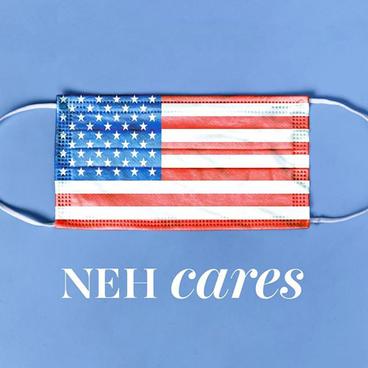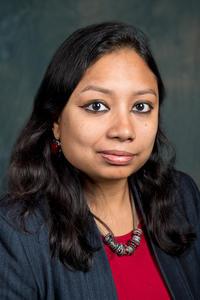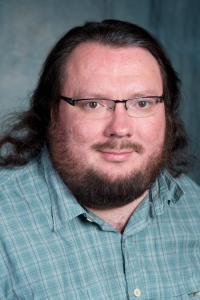Devaleena Das, assistant professor in the Women, Gender and Sexuality Studies program, and David Beard, professor of rhetoric, have received a $175,745 grant from the National Endowment for the Humanities (NEH). The project is called "Stories of Wisdom from Bodies in Separation (SWaBS): Archiving the Coronavirus Pandemic Through the Lens of Humanities."
It is part of an NEH initiative called CARES, a cultural organizations program to assist institutions and organizations working in the humanities that have been affected by the coronavirus to retain or hire humanities staff.
Center on the Body
Das, as principal investigator and Beard, as co-principal investigator, will lead a team to document and archive how the COVID-19 pandemic has impacted people and organizations.
As a body studies theorist, Das will lead the community professionals to explore the body, its interaction with technology and space and the practice of quarantine, and how the human body withholds an inherent potential to be creative and transformative during the pandemic.
As scholar of rhetoric and ethical listening, David Beard, will direct the community professionals in the ways to listen, as Beard says, “with an open heart,” attending to the language and the body of the interview subject. Utilizing his past experience collecting oral histories on anti-racist activities in Duluth, he will join Das in encouraging community professionals to hear the voices not always captured in traditional oral history projects.
Das, who is in the Department of Anthropology, Sociology & Criminology, and Beard, who is in the Department of English, Linguistics, and Writing Studies, will be joined by two College of Liberal Arts colleagues, David Syring, professor in the Department of Anthropology, Sociology & Criminology, and Jennifer Moore, associate professor in the Department of Communication. Syring and Moore will offer community professionals workshops on digital storytelling, interviewing, and crafting digital media.
As a researcher in corporeal feminism, body studies and medical humanities, Das is already working on stories of diverse human bodies for her book titled Anatomophilia. She is looking at alternative theories of human bodies based on narratives in real life, literature, art, religious myths, and performances, to convey, as Das says, “that respecting and honoring neglected bodies are crucial to prevent social injustices and develop a better healthcare system.” During this pandemic, she is particularly focusing on quarantine bodies.
The SWaBS project is about our memories not just as they reside in our mind, but also in our body. We experienced the Covid-19 pandemic in our bodies in many ways. Sometimes, we experience what researchers call "pathologized embodiment" (the term for when our mental reactions are intertwined with a bodily medical disorder). Even if we spent the time of quarantine in good health, the project is designed to record challenges in physical distancing, dietary habits, and bodily performances (e.g. yoga, dance). Reaching into some of the darker moments in the pandemic, the project wants to follow sick and lonely bodies in dialogue with other bodies during the pandemic.
Gathering Information
The researchers will attempt to capture the story of this unprecedented time, from individual experiences to community experience. The researchers will seek to document issues on the individual level, such as emotional challenges, routines for school children, examples of mutual aid, life for essential service workers, and other topics. They will also look at the wider level such as how businesses, governments, schools, colleges, health care agencies and religious, social, political and other organizations respond.
This project will financially support 13 community professionals who have been trained in the humanities. They are working in diverse industries, and all have been injured economically by COVID-19. The personnel list includes an adjunct faculty member and curator as well as furloughed or laid off professional journalists, library professionals, freelance writers, designers, artists, and small business and theatre professionals whose income has been slashed by the crisis. This project leverages UMD’s ability to sustain its colleagues in the community while furthering UMD’s mission as a land and sea grant university to preserve the stories and history of the region.
Sharing the Stories
This project will result in an open-access digital archive that will be housed in UMD’s Kathryn Martin Library. UMD library archivists, Aimee Brown and Shana Aue, have already started developing a digital archive related to the COVID-19 pandemic. Das and Beard will expand the scope of the library archive by contributing their collaboration on the NEH project research theme.
The work produced during this project will help to combat the “infodemic,” the deluge of information, misinformation, and conspiracy theories. SWaBS will demonstrate how digital humanities are essential to fighting infodemic, and the xenophobia that can follow, while making opportunities for employment for the local community. The materials produced by the grant work will be part of UMD's Northeastern Minnesota COVID-19 Community Archive Project. The scope of this project is extensive, as the thematic modules in the archive will provide critical materials to comparative and interdisciplinary research of pandemics across time and space.
About the Department of Anthropology, Sociology and Criminology
About the Department of English, Linguistics, and Writing Studies
About UMD's Northeastern Minnesota COVID-19 Community Archive Project.



